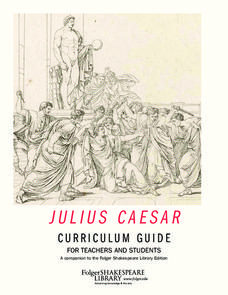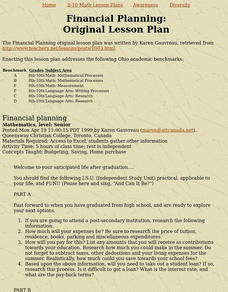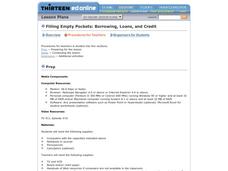Curated OER
Family Forms and Family Life Cycle
There are so many different types of families, and each family functions in a different way. Discover the different roles, responsibilities, and relationships that develop in different family types. The lesson provides you with five...
Curated OER
Buying New Stuff
Young spenders take a look at the best ways to save and spend money. This type of financial education is lacking in schools, so implementing this lesson would be of great value to your students. Things like bank checking account fees,...
Curated OER
Checks and Balances
Students discuss elements of financial planning. In this personal finance lesson, students practice filling out personal banking information. Students conduct research using the Internet and a PowerPoint presentation to find out how to...
University of Missouri
Money Math
Young mathematicians put their skills to the test in the real world during this four-lesson consumer math unit. Whether they are learning how compound interest can make them millionaires, calculating the cost of remodeling their bedroom,...
Council for Economic Education
Opportunity Cost
The price of those new shoes involves more than just money! Individuals explore the concept of opportunity cost using a video clip and gratification discussions. They prepare a budget based off of their set of values in regards to...
Curated OER
Money: Bucks, Banks, and Business
Put economics and currency exchange rates into a real-world application kids can understand. They'll compare bus fares from various cities around the world. Each child selects three international cities to research. They determine the...
Utah Education Network (UEN)
Decision Making
Making decisions, while maybe scary, is a skill that can be learned. Introduce teens to a five-step decision-making process that makes what may seem overwhelming possible. Pupils learn the steps and practice them by playing games,...
Practical Money Skills
Shopping Wisely
Work on making good shopping choices with a fun economics project. Kids analyze the differences between brand names and generic products, bigger and smaller units for purchase, and different places they can shop for different items.
Curated OER
Goals
Do your learners need help setting financial goals? Do they need to practice setting long-term goals? Keep teens accountable by providing the goal contract and encouraging them to check in with their goals! Give middle and high schoolers...
Workforce Solutions
Reality Check
Scholars complete the Reality Chech handout that identifies their potential salary given a specific profession. Pupils examine the lifestyle options and choose what they wish to have; however, each item costs money and, depending on how...
Folger Shakespeare Library
Julius Caesar Curriculum Guide
Julius Caesar need not be Greek to kids. The background information and suggestions for teachers, as well as the activities for learners, make this curriculum guide a must-have for your Shakespeare curriculum library.
Curated OER
Activity 1: If I Had Ten Dollars
In this money matters worksheet, learners fill in the blank in 12 sentences pertaining to what they would if they had 10 dollars.
Curated OER
Financial Literacy - Financial Institutions
Students discuss money management, financial institutions, services offered by the various financial institutions, advantages and disadvantages of each type of institution.
Curated OER
Scarcity and Choice
After reading the book A Bargain for Frances, young economists discuss how money is exchanged for goods or services. They demonstrate effective financial decision-making by listing ways to save money for a product they would like to buy.
Curated OER
Financial Planning
Students research possible careers. They determine typical starting income for the career. Using collected information, students develop a budget for their starting income. Students consider car payments and research the process of...
Curated OER
From the Mixed Up Files of Mrs. Basil E. Frankweiler
Students listen to From the Mixed-up Files of Mrs. Basil F. Frankweiler and discuss wants and needs. For this iincome and expenses lesson, students relate the adventures of the children in the book to a real life financial situation....
Curated OER
FILLING EMPTY POCKETS: BORROWING, LOANS AND CREDIT.
Students learn that maintaining financial security takes a good math understanding. In this lesson, students apply mathematical formulas to make important financial decisions like getting the right loan to buy a house, decide which...
Curated OER
Spend, Save, Invest or Donate (9-12)
Students explore the concept of personal finance. In this philanthropy lesson, students examine decisions they make about money as they discover the definitions of philanthropy, resources, scarcity, choice, benefits, costs, opportunity...
Visa
Consumer Awareness
Help your pupils become wise consumers and avoid becoming targets for consumer scams and fraud. Here you'll find a PowerPoint presentation, instructional guidelines, worksheets, and suggested activities for developing shopper strategies...
Visa
Earning Money
Where does money come from? Is it limitless and always available? Introduce your youngsters to the concept of earning through jobs and/or chores with a matching activity and provided worksheets.
Visa
Buying a Home
What is the difference between buying and renting a home? Learners become more informed consumers and financially literate adults after developing foundational knowledge of the home-buying process.
Thoughtful Learning
Setting and Reaching Goals
An activity boosts self-management through goal setting and reflection. Scholars choose one goal they wish to obtain by the end of the week. Participants brainstorm ways to make their goal a reality then reflect on whether or not their...
College Board
2004 AP® Macroeconomics Free-Response Questions Form B
A problem set explores how an international crisis could affect the economic health of Canada using authentic materials from College Board. Other questions ask learners to create and evaluate supply and demand curves and examine factors...
Curated OER
Spending Plans
Students explore the concept of dividing their money into categories, namely "save," "spend," and "share." They engage in activities that help them explain that money is limited in quantity and must be divided for different purposes.

























